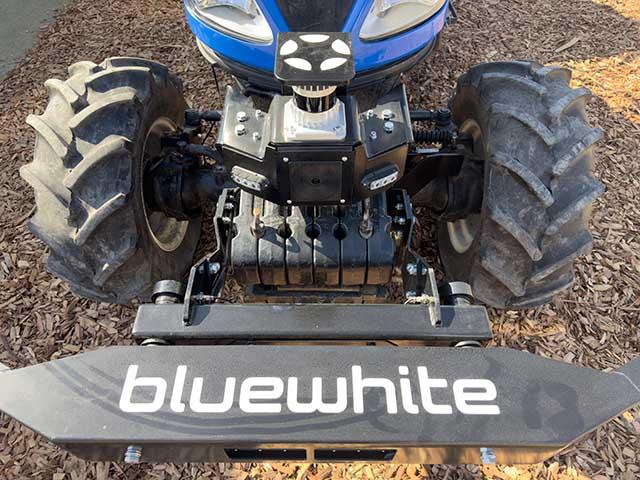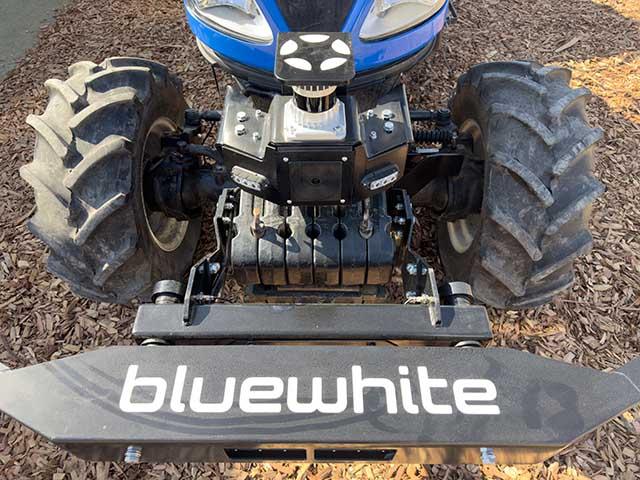MachineryLink
Israeli American Company Bluewhite Aims to Make Your Tractor Autonomous
TULARE, Calif. (DTN) -- Ben Alfi looked around and gambled.
The CEO of Bluewhite was midway through a media interview at the back of a large tent in the company's booth at the recent World Ag Expo farm machinery show in Tulare, California.
A half-dozen teenagers walked in the front.
Bluewhite is an Israeli American technology company focused on producing retrofit kits that add autonomous operation to existing tractors.
"Why do we need this technology?" Alfi asked, ready to prove a point.
The teenagers, Future Farmers of America members visiting the show, browsed through pamphlets on a table and watched videos demonstrating Bluewhite's capabilities.
Alfi called out to the first one, a girl at the front of the pack.
"Do you have a driver's license?" Alfi asked.
"Yes," she replied.
"OK, but can you drive a stick shift?" he asked.
P[L1] D[0x0] M[300x250] OOP[F] ADUNIT[] T[]
"Yes," she answered again.
Bad luck. The other students quickly confirmed they neither had licenses nor even a hint of what a clutch did.
The point: The labor shortage is acute, especially in the orchards, vineyards and specialty crops where Bluewhite is currently focused. There aren't enough bodies to help, and yesteryear's common sources of farm labor, like teenagers -- one particularly adept young woman aside -- aren't about to pick up any slack.
Bluewhite is seven years into its existence and has already gone from concept to prototype to product. It officially introduced its tech to the consumer market two years ago, and there are currently 100 kits in the wild.
Mostly, "the wild" consists of farms in California and Washington, but Alfi said the next step for the company is expansion.
He hopes to turn 100 kits on farms into 10,000 in the next three years.
"There are 400,000 tractors waiting for an aftermarket kit worldwide," he said.
The design and engineering work for the company happens in Israel. The machinery is built in Fresno, California.
The strategic company decision to bring autonomous capability to tractors via an add-on rather than new purpose-built machinery is one based on affordability.
"We want to create a return on investment from day one," he said. "There's no reason to buy a new tractor. You have a tractor. It's an amazing tractor. You have that type of tractor, and you know exactly what it suits. We want to take the tractor you love and make sure it can work on your farm autonomously."
The kit is meant to take about seven hours and two mechanics to install using sets of tools common to any farmyard.
That new equipment will include both LiDAR on the front of the machine and several optical cameras, each system communicating with the other and working to back up the other. GPS will also be used but only as a redundant backup, so a newly autonomous machine can operate without any kind of cellular or GPS connection.
He said the cost for a kit, paid via a subscription, is around $35,000 a year.
The kit can connect with smart implements, including a smart sprayer system recognized as one of the top products at the World Ag Expo. It also can connect with implements such as mowers and discs.
Alfi's ambitions for the company are lofty. So far, it's mostly entrenched on the West Coast in specialty crops where he says there's the most demand, due to a shortage of labor, and opportunity, thanks to longer growing seasons.
"We see the demand for (the Midwest), but we believe in three or four years, it will be much higher. This is why we are doing this now where the demand now is critical.
"We will go to other types of agriculture, then to anything off-road," he said. "Then, hopefully by 2040, you'll also see Bluewhite in space, helping with agriculture on Mars."
Joel Reichenberger can be reached at Joel.Reichenberger@DTN.com
Follow him on X, formerly Twitter, @JReichPF on X
(c) Copyright 2024 DTN, LLC. All rights reserved.





Comments
To comment, please Log In or Join our Community .